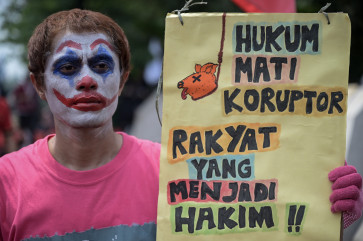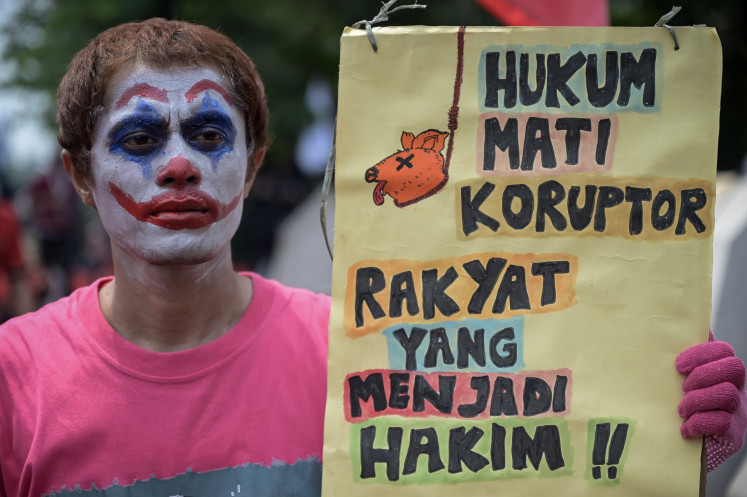Popular Reads
Top Results
Can't find what you're looking for?
View all search resultsPopular Reads
Top Results
Can't find what you're looking for?
View all search resultsAfter Shanghai, Mandiri eyes Malaysia to boost int’l clout
Bank Mandiri, Indonesia’s largest lender by assets, expects to open a subsidiary in Malaysia soon following the recent launch of the bank’s first branch in Shanghai, to boost its international presence and tap the growing number of Indonesian businesses and migrant workers overseas
Change text size
Gift Premium Articles
to Anyone
B
ank Mandiri, Indonesia’s largest lender by assets, expects to open a subsidiary in Malaysia soon following the recent launch of the bank’s first branch in Shanghai, to boost its international presence and tap the growing number of Indonesian businesses and migrant workers overseas.
Mandiri, which currently has overseas subsidiaries, branches and representative offices in Singapore, Hong Kong, London, Dili, the Cayman Islands and Shanghai, is seeking Malaysian approval to set up a full banking service in the neighboring country.
“Shanghai’s soft opening was on Nov. 17, and the grand opening is in February next year. But the branch is fully operating now,” Mandiri president director Zulkifli Zaini told The Jakarta Post in an interview on Thursday.
However, he said, the Shanghai branch was only allowed to receive deposits and channel loans in US dollars for the first two years of its operation. “We will only be able to work in renminbi after the two years of operating,” he added.
Zulkifli said that Mandiri’s global presence was mainly to serve Indonesian businesses, particularly exports and imports, as well as migrant workers. “In the past years, we have also served local businesses, but that did not really run as expected because we did not really know our clients,” he added.
China is Indonesia’s top trading partner, with Indonesian exports of non-oil-and-gas products valued at US$14.9 billion, which is 12.3 percent of Indonesia’s total export value, and imports of Chinese non-oil-and-gas goods valued at $18.57 billion, or 18.6 percent of Indonesia’s import market, according to Indonesian Central Statistics Agency’s (BPS) September data.
“We also have a lot of migrant workers in Malaysia and we are planning to open [a subsidiary] there. Currently, we only serve international remittance services there, not full banking services,” Zulkifli said.
Indonesian migrant workers in Malaysia, of which there were about 1.2 million last year, contributed the most to the nation’s remittance, with $1.7 billion of the overall $5.11 billion worldwide, according to Bank Indonesia’s (BI) third quarter data.
Mandiri is currently negotiating the Malaysian central bank’s requirement to have starting capital of 300 million ringgit to open a subsidiary unit there.
Negotiations became deadlocked after Bank Negara Malaysia accepted the lender’s wish for 100 million ringgit ($31.40 million) in initial capital, but with the condition that the capital be increased to 300 million ringgit within five years of operation.
“We conveyed our conditions to Bank Negara Malaysia to open a subsidiary there with 100 million ringgit in initial capital, without having to increase it to 300 million ringgit within five years,” Zulkifli said.
Mandiri is also required to limit its Malaysian branches to 12 — with a maximum of two in city centers, four in suburb areas and six in rural areas — and to only install automated teller machines (ATMs) in its branches.
“We want to be able to open branches anywhere, ATMs anywhere,” Zulkifli said.
“We did not terminate the plan. Those are our conditions. We haven’t heard from them until now. It’s been months,” he added.
Indonesian lenders have called for reciprocal treatment from banking authorities overseas because local rules make it very easy to set up banks here — with 99 percent maximum foreign ownership in domestic banks — while regulations overseas are stricter.
However, the planned integration of Southeast Asian economic activities by 2015 into an ASEAN Economic Community has renewed hopes of a fairer playing field.
Mandiri is currently the sixth-largest ASEAN lender by market capitalization, after Malaysian giants CIMB and Maybank, Indonesian private lender Bank Central Asia (BCA) and three Singaporean banks.
“We aim to be number five by 2014 and number three by 2020, but looking at recent developments, we hope we can reach number five sooner,” Zulkifli said.
Mandiri’s shares, among the most actively traded on the Indonesia Stock Exchange (IDX), traded at Rp 6,700 on Thursday, with a market cap of more than Rp 150 trillion — the fourth-biggest among all listed companies on the local exchange.
The stock, coded BMRI, has gained almost 7 percent this year, outperforming the broader stock index, which is down 0.19 percent this year.










